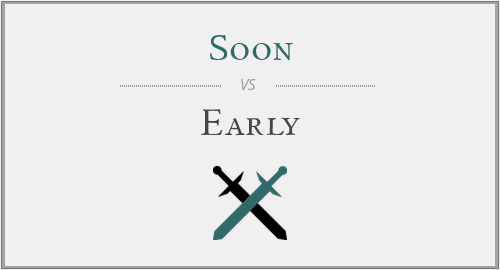“I am planning to start a business soon…”
“I will have an early lunch tomorrow…”
In the above sentence, soon represents a time which is not yet decided. Soon means in a short time, but we don’t know what that exact time is.
Early is relative. It indicates a time before the usual time. For example, if you have lunch at 1pm every day and you say ‘early lunch’, that would mean before 1pm.
That’s why when someone is sick, we say get well soon and not get well early!
So, while early is a relative indicator of time, soon means in a short while from the current time.
Early
Early is used as an adjective and adverb both. It means something untimely, prior, premature or too soon.
· I have an early shift tomorrow.
· We reached airport very early and had a nice breakfast in the lounge.
· I tasted this wine earlier today and I did not like it.
· There is a special discount for the early birds.
· Can you come early on Saturday?
What is early bird discount?
It is a special discount offered to those are amongst the first few to grab an offer. For example, if there is a sale of plot and the marketing message goes like – “Early bird discount – extra 10% off for those who block their slots today!”. This means that you will get an additional 10% off if you block your slot today. Tomorrow you will not get this offer. This is so that you grab the offer ‘early’ and close the deal.
Earlier?
When early itself is relative time, what is earlier?
Earlier is a reference point of time before a particular time. It can also mean sometime back. Since it is a comparative degree, we use ‘earlier than’ or a reference like earlier today.
· He came earlier than expected. – we can also say he came early – but earlier is more specific.
· I went for a jog earlier this morning – that means it is still morning (may be 8am) and I went for a jog around earlier than the current time, say 5am. – I went for a jog early morning – this could mean any time during early morning hours (4am-8am)
· Earlier today, when I was sleeping, I heard some weird sounds from the neighbour’s house.

· I finished my work earlier than usual, so I watched a horror movie.
· I met your daughter earlier today. She was wearing a pink gown.
· You can take this gadget with you but not earlier than tomorrow.
Let us say, you go to office at 9am every day. Today you reach office early i.e. 8am. Tomorrow you plan to reach office earlier than today i.e. 7.45 am.
So, tomorrow you will be early as well as earlier than today!
Soon
Soon is an adverb that means in a short while or time. The word has its origins from old English ‘sona’ meaning immediately.
· See you soon.
· She left the house as soon as the sun rose.
· We will be there soon.
Soon doesn’t talk about a particular time though. How soon? We don’t know!
Soon has a sense of urgency that early doesn’t have. For example,
Can you send this document as soon as possible – we need it almost immediately.
Can you send this document as early as possible – Send the document whenever you are done and do it faster than your usual pace!
No sooner… than… - We use this phrase when a second event occurs immediately after the first. “No sooner had the bride arrived than the ceremony started.”
Sooner rather than later – If you get ready sooner rather than later, we will not miss the trailers that are shown before the movie starts.
Sooner or later – It means eventually. For example – Sooner or later you have to get married, why not start searching for a bride now itself!
Very soon – It has more sense of urgency than soon. “We will get back to you on this issue very soon.”, “Very soon, we will be getting new tables for our office.” “He left from our house sooner than we thought.”
I hope you have enjoyed reading this article as much as I enjoyed writing it. Sooner or later, you will have to master the English language, it will be good to start early/as soon as possible.




Have a discussion about this article with the community:
Report Comment
We're doing our best to make sure our content is useful, accurate and safe.
If by any chance you spot an inappropriate comment while navigating through our website please use this form to let us know, and we'll take care of it shortly.
Attachment
You need to be logged in to favorite.
Log In